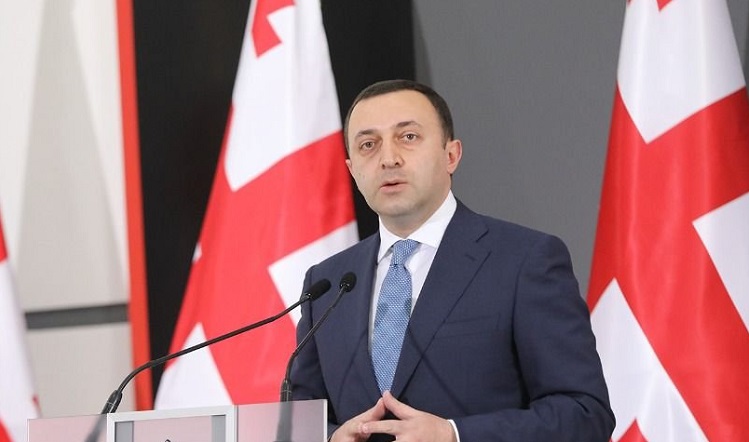Georgian PM stresses peaceful reintegration on anniversary of fall of occupied Abkhazia’s capital

The Georgian prime minister said on the 29th anniversary of the fall of Sokhumi that “the future belongs to the unity, peace and prosperity of Abkhazians and Georgians”. Photo: government of Georgia press office
Georgian prime minister Irakli Garibashvili on Tuesday reiterated the importance of peaceful reintegration of the Russian-occupied Abkhazia and Tskhinvali (South Ossetia) regions of Georgia in comments marking the 29th anniversary of the fall of Sokhumi, the regional capital of the former, in the 1992-1993 conflict in the north-western region.
In a social media post, the head of the government stressed the country’s unification “is the goal of each of us and it is based on our belief that living in a united, strong, developed country is the best prospect for our people”.
The Georgian flag flying at half-mast at the administration building of the governmnet of Georgia.
Paying tribute to the victims of the 1990s armed conflict that broke out following the restoration of Georgia’s independence from the Soviet Union, the prime minister said the “tragic day” had displaced thousands of Georgians who have been unable to return to their homes so far.
We strongly believe, and the current Georgian government has proven it many times with its actions, that the only way to the major goal [of unification] lies through peace, dialogue and cooperation. The future belongs to the unity, peace and prosperity of Abkhazians and Georgians", Garibashvili said.
Flags at half-mast at the ministry of defence of Georgia, commemorating the tragic day.
Marking the 1993 date of the fall of Sokhumi, which also symbolises the loss of control over the region for Georgia, the national flag is flying at half-mast at all government buildings across the country today.
The armed conflict in Abkhazia began on August 14, 1992 by an entrance of Georgia’s armed forces into the region with the goal of defending a section of a strategically important railway in the region amid tensions between ethnic Abkhazians and Georgians, with the government units confronted by Abkhaz paramilitary forces on contact.
The Georgian interior ministry lowered flags to mark the date.
The resulting year-long-conflict saw Russian material, tactical and operational support for Abkhaz forces, in addition to mercenary groups from the Caucasus republics of Russia also fighting against troops of the fledgling Georgian state.
Regional capital Sokhumi fell after the Abkhaz side violated a ceasefire agreement between the sides on July 27, 1993 and launched an assault on the city on September 16, after the Georgian side had withdrawn most of its defences as per the agreement.
On September 27, the attacking troops captured and killed Zhiuli Shartava, the chairman of the council of ministers of Abkhazia, as well as Sokhumi mayor Guram Gabeskiria and 27 other Georgian officials of the executive body who had stayed in the offices of the regional government in the city, with the event marking the fall of the capital.
The national flag at half-mast at the parliament building.
Between 13,000 to 20,000 ethnic Georgians and approximately 3,000 Abkhaz have been reported killed during the conflict which lasted for 13 months and 13 days. Over 250,000 Georgians fled the region and became internally displaced in the country, while more than 2,000 - including about 1,500 ethnic Georgians, up to 200 ethnic Abkhaz and about 100 ethnic Ossetians - were declared missing.
- See the multimedia story by Agenda.ge about the Babushera tragedy here.
In the wake of the Russia-Georgia war in 2008, Russia recognised the two occupied regions of Georgia as independent states, with only Venezuela, Nicaragua, Nauru and Syria joining the move so far. The rest of the international community recognises the regions as part of Georgia and has called on Russia to withdraw its troops from the occupied territories as stipulated in the ceasefire agreement that ended the conflict.
 Tweet
Tweet  Share
Share